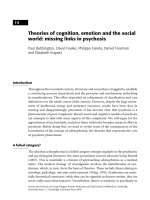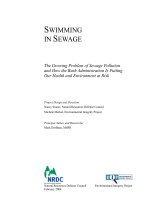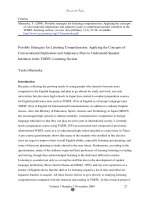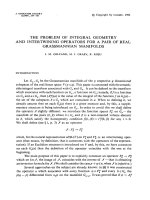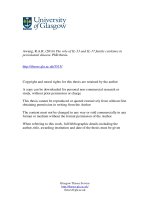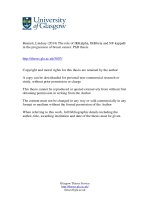Maneuvers in the oeuvre the problem of confession in the works of foucault, mishima and winterson
Bạn đang xem bản rút gọn của tài liệu. Xem và tải ngay bản đầy đủ của tài liệu tại đây (484.23 KB, 97 trang )
MANEUVERS IN THE OEUVRE:
THE PROBLEM OF CONFESSION IN THE WORKS OF FOUCAULT,
MISHIMA AND WINTERSON
Tan Yong Yeong
Thesis submitted in part fulfilment of the requirements for the degree of
Master of Arts (English Studies)
Department of English Language and Literature
Faculty of Arts and Social Sciences
National University of Singapore
Singapore
2009
Signed Statement
This dissertation represents my own work and due acknowledgement is
given whenever information is derived from other sources. No part of this
dissertation has been or is being concurrently submitted for any other
qualification at any other university.
Signed:……………………
ii
Acknowledgements
I would like to thank Dr. Tania Roy for her patience, guidance and support
in the course of writing this thesis.
iii
Contents
Signed Statement
ii
Acknowledgements
iii
Abstract
vi
Introduction: Out, But Where
1
Chapter 1: Foucault and Anonymity
15
Chapter 2: Self-Revelation Without Transparency
38
Chapter 3: Shifting Power Dynamics
67
Conclusion
85
Works Cited
88
iv
Abstract
This thesis examines how writers negotiate the subject positions in which
the public act of writing places them. The works of Michel Foucault, Yukio
Mishima and Jeanette Winterson demonstrate how writers may foreground
their resistance towards discursive penetration despite an ostensibly
confessional stance, and establish their works as a site where deliberate
incoherence, as much as much, can be produced. In Chapter 1, I argue
that Foucault’s works demonstrate the importance of considering the selfrepresenting subject in his works. Focusing on Mishima’s Confessions of a
Mask and Winterson’s Oranges Are Not the Only Fruit, I argue in Chapter
2 that the identifiability of autobiographical elements in the works
reinforces the paradox of authenticity and façade that the novels present.
In Chapter 3, I argue that Mishima and Winterson further problematize
authorial control through more complex works of self-revelation,
highlighting both the necessity and inevitability of interpretation and the
potential violence it entails.
v
Introduction: Out, But Where?
“[E]very time I go into a Borders, I move a few books from the gay
fiction shelf to the general fiction section, restoring them to their rightful
place in the alphabetical and promiscuous flow of literature.” (Leavitt)
Beyond what goes on in bookstores, what Leavitt implies is that, as a
category of identification, the prominence of queer subjectivities should be
reduced and integrated with others who do not seem to be categorized
according to sexual orientation. It is fairly easy to understand Leavitt’s
reluctance to see “gay fiction” being placed on a separate shelf, as though
sexuality takes precedence over all else as a primary category of
subjectivity, especially when it comes to queer sexualities. This is firstly
limiting to those who openly identify themselves as gay but see sexual
orientation as only a facet of their identities and it would seem as though
the works of gay writers are invariably about sexuality. Secondly, and
more importantly, the continued separation and prominence of queer
sexualities in general, ensures that queer sexualities will never be equal to
heterosexuality because they are publicly circulated as a separate
category (there are no shelves for heterosexual fiction, one might note),
perhaps even as a curious spectacle. Leavitt is not suggesting, however,
that queerness withdraws into the closet and disappears without a trace of
its existence—he wants gay fiction on the shelves but not on a separate
shelf and he does not see a reason to give a separate category to fiction
by gay writers or with gay characters. Other than raising the question of
what the place of queer sexualities should be out of the closet, what
Leavitt says also reminds us that books, perhaps fiction in particular, are
1
an instrument through which discourses of identity are circulated and
perpetuated.
One condition that has made it possible for queer sexualities to
exist as a separate category, not only in bookstores but also in societies in
general, is the acts of self-revelation in literature. Such acts may be
intended as self-assertion, a claim to legitimacy or a challenge to
discrimination. However, it is also through the repetition of such
assertions that the categories are produced and accepted as truth.
It is possible to examine the practices of self-revelation as selfnarration or self-authorship that involves not only the revelation or
representation of individuals, but also the production and reconfiguration
of subjectivities, probing the cultural conditions and circumstances that
allow or even encourage such practices.
Writing and other practices of revealing the self are commonly
understood as practices whereby private lives are brought to the view of
the public and whereby otherwise concealed facets of individuals are
exposed. However, it also takes a certain degree of naivety for one to
believe that self-revelatory texts can generally be treated as transparent,
straightforward records that are transmitted from authorial selves to an
audience that can access the subjects represented in the texts without
any representative or interpretive distortions made by either the author or
the reader. The author that ostensibly writes to reveal certain aspects of
himself or his life, by performing an act of selection, inevitably offers an
incomplete and even inaccurate epistemology of the self. More could be
studied about the matrix of relations between the person who happens to
2
write (the subject that would exist even without any writing), the writer as
a public figure, the text or representation and the reader who receives
and interprets.
Instead of taking self-revelation to be an act of autonomous selfassertion, one can analyze self-revelation in terms of the relations and
gaps between the speaking or writing subject, the representation, and the
interpretation involving an audience or a reader. As aesthetics or as an
act of representation, a text that reveals the self embodies a paradox: if
the act off writing is itself a part of the process of subject formation (or
transformation) or self-fashioning, the text, then, is not just a site of
revelation but also a site of production. Texts of self-revelation might
stand as a testimony to a self that is being reconstituted by the act of
revelation without sufficiently or directly representing the reconstituted
self. In other words, representations will always be inadequate because
the act of representing redefines the represented. [A strategy of elusion?]
A text of self-revelation can serve as an unstable signifier of the self that
inhabits various positions, including the positions of the represented
subject of the text, the self-fashioning subject in the process of producing
the text, and the subject that has made the text possible.
One might locate self-revelation within an impulse in broader sociocultural practices. Writings about the self can be seen as an instance of a
modern confessional impulse, particularly as regards sexuality. In the
works of Michel Foucault, there is a recurring concern with various
practices of self-revelation that can come under the notion of confession
in its broadest sense. Foucault sees confession in Western societies as a
3
widespread practice originating from a traditionally Christian technique,
but which has diffused into various secular, institutionalized practices. The
traditionally Christian mode of confessing to a religious figure is now no
longer merely a religious practice, but has evolved and become
paradigmatic of various aspects of modern (Western) culture, including
the confession of patients to psychiatrists and the confessions of criminals
in court.
In a series of lectures Foucault gave at the Collège de France (19741975), translated and published posthumously under the title Abnormal
(English translation). Foucault highlighted how the modern judicial
process harnesses medical and psychiatric knowledge to prove guilt via
discourses is an impulse to confess which does not lie isolated within
certain medical or juridical institution, but which is fostered by a more
general socio-cultural ethos. In Foucault's words:
If we go to the psychiatrist, psychoanalyst, or sexologist so
frequently to consult them about our sexuality, it is precisely
to the extent that all kinds of mechanisms everywhere—in
advertising, books, novels, films, and widespread
pornography—invite the individual to pass from this daily
expression of sexuality to the institutional and expensive
confession of his psychiatrist, psychoanalyst, or sexologist.
(170)
Where Foucault is concerned, scientific (or pseudo-scientific) discourses of
sexuality with accompanying discourses regarding normality have given
rise to the figure of the expert such as the psychiatrist. The authority of
4
the expert on matters such as sanity does not work by strict imposition;
instead, it has seeped into a general public consciousness, shaping the
way human subjectivity is instinctively understood. Notably, for both the
Christian confession and the clinical confession, "Expert" authority is not a
quality inherent to the priest or to the psychiatrist. These subjects of
authority are, in fact, governed by their respective epistemologies of
truth, namely God in the case of the Christian confession, and scientific or
medical knowledge in the case of the clinical confession. In this sense, all
individuals can be said to play certain subject functions in the web of
power relations.
Foucault provides a more sustained development of the ideas
relating to sexuality, confession and the productivity of power in The
History of Sexuality. In The History of Sexuality: An Introduction, he
examines the transformation of "sex" into discourse. In the seventeenth
century, Christianity had made it an "obligation" to translate all aspects of
sexuality into speech, although the "scheme for transforming sex into
discourse had been devised long before in an ascetic and monastic
setting" (20). The use of language (speech) to represent or express
oneself becomes a primary mechanism of power. Foucault points out that
"[a]n imperative was established: Not only will you confess to acts
contravening the law, but you will seek to transform your desire, your
every desire into discourse" (21). It is by no means solely a matter of
transforming desire into discourse, but also a matter of transforming
desire itself (and, by extension, subjectivity) by so doing:
5
This is the essential thing: that Western man has been drawn
for three centuries to the task of telling everything concerning
his sex, that since the classical age there has been a constant
optimization and an increasing valorization of the discourse on
sex; and that this carefully analytical discourse was meant to
yield multiple effects of displacement, intensification,
reorientation, and modifications of desire itself. (23)
By speaking of one's sexual desires, however, the effect is not (or at least
not always) the suppression of desires. Rather, it is as though certain
facets of one's sexuality are amplified by confession, perhaps at the
expense of other facets of sexuality because the counterpart of
confessional revelations is their elisions. From another perspective, one
might see that although subjectivity can be amorphous and inscrutable, it
has increasing been delimited into convenient, examinable compartments
that facilitate the proliferating processes of governmentality characteristic
of Western modernity. It is also by emphasizing selected aspects of one's
subjectivity that other facets recede. In Abnormal, Foucault reminds us
that "confession as a procedure of power is . . . primary and fundamental
and it is around this practice . . . that the rule of silence is able to
function. [C]ensorship is . . . a negative process governed by a positive
mechanism" (169). To carry the idea further, there is no discursive free
play, and the constitution of the self within discourse involves a
delimitation of the self to a specific locus.
The productivity of power in creating multiple subject positions to
be inhabited by individuals through their participation in discourses of the
6
self seems to simultaneously open up possibilities for individual identity
while also consigning individuals to various positions of relative fixity. One
could note a shift from the Christian model of confessing specific sins—
transgressive actions or desires—in detail, where the confession is meant
to signify a clean break from sin. The aesthetics of self-revelation, instead
of being separate and distinguishable from the represented actions or
desires, can be seen as an extension—a continuation— of the actions or
desires revealed, perhaps expanding the regimes of pleasure involved.
Rather than being "terminal" or inhibitive, such modern practices of
confession, drawing from institutionalized knowledge and practices, allow
for the recollection, reiteration and intensification of the confessed actions
or desires. The act of confession concretizes that which is confessed via
medical truths or knowledge; the confessing self is then given definition
via such knowledge. To make claims about one's sexuality through
scientific expertise, for instance, is to situate oneself within the categories
used by scientific discourses. Thus, while there are multiple avenues of
self-revelation, the self also becomes isolated to and confined within
positions penetrable by dominant knowledge. In contemporary culture,
one may see the manifestation of this paradox in much of the politics
involving identity (movements such as gay activism). The tendency of
identity politics to neglect difference has already been pointed out by
thinkers like Angelia Wilson (A Simple Matter of Justice?). To problematize
it further, a call for equality or an attempt to "naturalize" the status of
certain groups of people in society often invokes precisely the categories
that serve to isolate and set these groups apart. While this does not
necessarily mean that such action is doomed to futility form the start, it
7
underscores the problematic nature of certain modes of resistance in
discourse.
More specifically, in literature, the "coming out" narratives of gay
and lesbian writers may be yet another instance of how confessional
practices are implicated in such a paradox. In the words of Toni McNaron:
As members of a historically invisible minority, lesbians and
gay men have routinely had difficulty positioning ourselves,
partly because we have no language with which to do so and
partly because the larger culture has supplied not acceptable
mirrors or images by which to fashion ourselves. (Internet
resource)
McNaron echoes Foucault, who points out in the first volume of The
History of Sexuality that the discourses of sexuality "also made possible
the formation of a 'reverse' discourse: homosexuality began to speak in
its own behalf, to demand that its legitimacy or 'naturality' be
acknowledge, often in the same vocabulary, using the same categories by
which it was medically disqualified" (101). William Turner, similarly,
rephrases Foucault but with greater care not to emphasize that the
medical categories have to be recognized as problematic: "The protocols
for 'scientific' descriptions of 'homosexuals' provided the opportunity for
'homosexuals' to adopt a group identity and respond on their behalf" (54).
Yet, even with Turner's qualifying quotation marks when he uses
the term "homosexuals," the viability of a counter-discourse that might be
naively dependent on the discursive categories that have served as
functions of power is questionable and, indeed, questioned, by Foucault.
8
In contrast to McNaron, in Epistemology of the Closet, Sedgwick (who also
works with Foucault's ideas) points out that "'Closetedness' itself is a
performance initiated as such by the speech act of a silence . . . that
surrounds and differentially constitutes it" (3). McNaron's metaphor of
invisibility does not quite capture the situation. The marginality of gays
and lesbians is not exactly a state of invisibility that can be easily
overcome by rendering this group of people visible. To begin with, a truly
"invisible" group would not be identifiable in discourse. If gays and
lesbians have been marginalized in Western culture, it is because the rise,
popularization and naturalization of the category of homosexuality,
together with accompanying discourses of morality or normality, have
discursively identified and singled out—rendered invisible, in other
words—a group of individuals as homosexuals. As such the move of
coming out, in fact, enhances the visibility of an already visible group. The
individual writer who comes out as a gay or a lesbian is compelled to
partake in and propagate (through the medium of writing) the very
discourses that have also served to marginalize them, while perhaps also
believing that their participation in these discourses is liberating. Selfrevelation is, in the words of Sedgwick, a "disclosure at once compulsory
and forbidden" (70).
For the writer of coming out narratives in particular, coming out
also signifies his or her entrance into the public as a gay or lesbian writer.
From McNaron's perspective, the writer of coming out narrative is
asserting individual uniqueness while integrating with a group: "I assert
my specialness at exactly the same moment as I identify with and affirm a
group." (Internet resource) From another perspective, coming out ma not
9
always be a matter of group solidarity but could serve to critique the
workings of the group itself as "narratives about coming out reflect,
constitute, and challenge the cultural norms of the gay and lesbian
community" (Bacon 252). Furthermore, if one considers specifically the
published and publicized accounts of coming out, it is clear that more is
involved that self-assertion and identification since the public consists of
more than the group with which the individual identified. If there already
is a certain public gaze on the gay and lesbian community, a coming out
narrative may be seen as an invitation to focus the gaze upon individual
writers.
Yet writers who engage in a mode of self-revelation do not write
only "coming out" narratives or narratives that reveal their sexuality, if
they do so at all. As suggested earlier, acts of self-revelation need not be
taken as terminal acts resolving issues of the self. They can, instead,
produce further possibilities of revealing or reconfiguring the self and the
self as writer. One may also make a further distinction between
confessions in literature and other art forms and confessions facilitated by
discourses of medical or juridical institutions. If the patient/psychiatrist
relationship seems to be an extension of the sinner/priest model of
confession (because both models involve individuals subjecting
themselves to the gaze of figures in whom authority is invested),
literatures of confession seem to offer a somewhat different model. With
the literary confession, there is no one gazer, but a heterogeneous public
without a fixed source of "authority."
10
If a self-revealing writer establishes a public persona through a
confessional work, it may be useful to consider the broader range of work
that he or she has produced in order to investigate how the public
persona could be exploited, negotiated and reinvented. This thesis will
embark on such an investigation through the works of Yukio Mishima and
Jeanette Winterson.
It is perhaps not immediately apparent why I am bringing together
these two writers. Mishima, a Japanese writer writing after the Second
World War, is widely known for his death by seppuku (Japanese ritual
suicide) in 1970. Winterson, on the other hand, is a British writer whose
first novel was published in 1985. Yet despite the obvious differences in
the cultural backgrounds of the two writers and even in the eras in which
they live, they share certain similarities. Both writers started gaining
literary recognition and public awareness from works that are arguably
autobiographical. For Winterson, it was her first novel, Oranges are Not
the Only Fruit. For Mishima, it was his second novel and first significant
published work, Confessions of a Mask, which was published in 1948.
Much of Mishima’s novel deals with various aspects of the protagonist’s
sexuality, and the protagonist’s experiences are often replications of
Mishima’s own. The same goes for Winterson, while Oranges is about a
girl bought up in a fanatically religious family and who has to come to
terms with her sexuality. Both writers, however, do not see their works as
straightforward autobiographies.
Works that are partly autobiographical and those that play with the
conventions of the autobiography and other genres are by no means
11
unique to Mishima and Winterson. Prominent examples include Gertrude
Stein’s The Autobiography of Alica B. Toklas, which was published in
1933, and Sylvia Plath’s The Bell Jar, which was published in 1963. The
situation for Mishima and Winterson, however, is more peculiar even if it
is not strictly unique. Because of the self-revelatory works that gained
them prominence as writers, both Mishima and Winterson have to deal
with the expectations their autobiographical novels set in the public. It is
easy for them to be taken as queer, confessional writers when their
writings could be more complex. Both writers take a turn to increasing
self-reflexivity and their works become increasingly stylized, often dealing
with various aspects of the reader/writer relationship. While we may start
approaching the works of the writers from the perspective of queer or
marginalized sexualities, we can end up with the realization that the
“queer” is likely to represent merely an instance of a more general issue
of subjectivity that the writers concern themselves with. In many of their
works, they suggest an awareness of and an engagement with or even a
resistance towards the way their works are received and circulated.
The issue I wish to deal with is not just the matter of how writers
reinvent their public personae. Instead, the involvement of confession
(and by extension, sexuality, given the close association between
confession and sexuality is also critical. There is often a high degree of
self-reflexivity. One could start by examining the disclosure of oneself
through the production of narratives of the self that are publicly
circulated. This could be followed by an examination of how self-revelation
is self-reflexively negotiated within a writer’s oeuvre. The shifting
positionalities that the confessing subject occupies can then also serve as
12
a domain of analysis. The works of writers like Mishima and Winterson
serve to constantly reformulate how the writers’ subjectivities are
understood and received by the public, undermining reductive labels such
as “the lesbian”. I will argue that through self-reflexive moves that
interrogate the stakes of self-revelation or confession, Mishima and
Winterson create and occupy multiple subject positions, thus reconfiguring
and undermining conventional power relations between confessor/writer
and the audience/reader. Underlying this argument is the suggestion that
if each writer’s work is reading intertextually across his/her oeuvre, the
shifts in power relations will be much more apparent.
In the next chapter, I will provide an exposition and a reading of
Foucault’s work. I will draw from Foucault’s ideas regarding sexuality and
confession and illustrate the way Foucault presents his own position as an
author so as to pave the way for the analysis of Mishima’s and
Winterson’s works in the subsequent chapters. Chapter 3 will be an
exploration of how Mishima’s Confessions and Winterson’s Oranges makes
use of autobiographical forms to interrogate confession. In Chapter 4, I
will consider how both Mishima and Winterson destabilize the positions of
author, subject of representation and reader through their works.
13
14
Chapter 1: Foucault and Anonymity
In an entry on Foucault in “Dictionnaire des philosophes” (1984, available
in Foucault.info), Foucault is described as having
undertaken . . . to study the constitution of the subject as an
object for himself: the formation of procedures by which the
subject is led to observe himself, analyse himself, interpret
himself, recognize himself as a domain of possible knowledge. In
short, this concerns the history of "subjectivity", if what is
meant by the term is the way in which the subject experiences
himself in a game of truth where he relates to himself.
The entry, attributed to Maurice Florence, provides a helpful outline of
Foucault’s work on subjectivity and the idea that the subject is formed not
merely as an object of knowledge, but also as an object “for himself,”
highlights the self-regulation of the subject through knowledge. Maurice
Florence, it has to be pointed out, was a pseudonym Foucault used. The
act of writing about his own works in the third person with a pseudonym
is perhaps a self-reflexive “game of truth” in which Foucault is engaged.
The entry in the dictionary does not seem playful insofar as it provides an
outline of Foucault’s oeuvre. However it would seem that Foucault is not
merely holding himself up as an object of knowledge for himself, but also,
through an act of self-revelation, creating the possibility of a different
discursive space in which the awareness of such an act allows the
15
knowledge of the self to be questioned. Through the exploration of key
ideas in Foucault’s works that follows, I will suggest that it may be
gleaned from the works that a self-reflexive self-revelation and the
possibilities of interpretation it brings about may generate a space in
subject positions become fluid rather than fixed.
In the introduction, I have already highlighted several of Foucault’s
ideas in relation to the issue of self-revelation in literary and other artistic
ventures. I find it necessary at this point to take a step back to consider
Foucault in a more general sense before moving forward for a more indepth consideration of Foucault’s works. In this chapter, I will provide a
more substantial exposition and discussion of Foucault’s works and
illustrate how they can be useful in a consideration of self-revelation.
There will first be an exposition and discussion of the works of Foucault
that will, as it were, establish a framework for the exploration of Mishima
and Winterson’s works in the chapters that follow. The second direction of
the discussion will involve a turn to question precisely the establishment
up of a “Foucauldian” perspective or framework for textual analysis. This
is not to negate the initial part, but rather, to further explore the issues
involved by considering Foucault’s stylization and moments of selfreference (both in the sense of Foucault referring to himself as an author
and of him referring to his own works) and the possibilities brought about
by a self-reflexive negotiation of “authorship”. In other words, what
Foucault has left unstated will be as important as what he has stated.
Examining Foucault’s works in general, they may be said to be a
critique of Western modernity, including the workings of power through
16
institutions, practices and discourses that it has brought about. Foucault
has explored issues ranging from psychiatry and madness to
governmentality and biopower. Western modernity, as characterized by
Foucault’s works, is marked by a proliferation of various categories of
subjectivity, accompanied by institutions and discourses that serve to
regulate the self by establishing knowledge of human behaviors and the
human body. The relationship between subjectivity and power is one of
Foucault’s central concerns. For Foucault, the human subject is a subject
of power that occupies various subject positions. Foucault’s work can be
seen in terms of how it may be distinguished from Marxist thought and
psychoanalytical theory. Conventional Marxist perceptions of the subject
involve notions of ideology and false consciousness—it is as though an
“external” power is imposed on a subject who internalizes a false
understanding of one’s circumstances in society. On the other hand,
conventional psychoanalysis tends to focus on uncovering interior, as
though the subject is hidden even from himself. For Foucault, the subject
is not so much a product of false consciousness as much as it is a product
of what is established by various discourses of the self to be true. The
confessional process that conventional psychoanalysis would hold up as a
technique of accessing an a priori subject becomes for Foucault the very
technique through which the self is produced.
If Marxist conceptions of subjectivity focus on exterior forces
penetrating and configuring subject and psychoanalytical conceptions
focus on interior forces shaping exteriorly observable behavior, Foucault
stands in contrast not by rejecting either model, but by focusing on
relations and how they come about. For Foucault, subjectivity is defined
17
not merely by imposition from the “outside” or an expression from the
“inside”, but more by the positions a subject inhabits in relation to
another. This has implications on examinations of confessional practices.
The confessional literary text can neither be seen as merely an expression
and management of interior psychic impulses through language nor as
complicity with an exterior ideology or even an attempt to transcend such
an ideology. Confession is part of the process of subject formation. In this
regard, it would not be sufficient to examine a confessional text and the
subject apparently represented within. Instead, one would have to
examine confessions as manifestations of subject relations, the conditions
that give rise to particular confessional practices and how subjectivity is
reconfigured by the act of confession. At the same time, one might ask if
the act of confession could be appropriated through aesthetics to recast
power relations.
It is neither feasible nor productive to discuss the entirety of
Foucault’s works here, and the discussion that follows is necessarily
limited to several themes in selected works. One of these themes is
discursivity and the position of the speaking or writing subject,
particularly with regards to the confessional mode. This will in turn be
considered in relation to art, literature, representation and authorship in
the production of narratives and other texts of the self. The approach here
is a thematic rather than a chronological exposition of Foucault’s works. In
fact, one can first consider Foucault’s final book-length projects, the three
volumes of The History of Sexuality. The first volume was first published
in 1976. The second and third volumes, subtitled The Use of Pleasure and
The Care of the Self respectively, were published before Foucault’s death
18
in 1984.
In The History of Sexuality: An Introduction, Foucault starts off by
debunking the popular perception that sexuality was taboo to the
Victorians, showing that there was instead an impulse to talk about one’s
sexuality. Foucault is not solely or even primarily concerned with
correcting a misconception of the Victorians, but is concerned, instead,
with a present condition. He asks: “Why do we say, with so much passion
and so much resentment against our most recent past, against out
present, and against ourselves, that we are repressed?” (9) The more
important issue for Foucault is that accompanying the perception of
Victorian restrictiveness regarding sexuality is the perception that
contemporary societies have inherited a legacy of inhibition and that there
is thus a need to rid ourselves of it: “But have we not liberated ourselves
from those two long centuries in which the history of sexuality must be
seen first of all as the chronicle of an increasing repression? Only to a
slight extent, we are told” (5). Implicit in such perceptions is the
dichotomy between sexual restrictiveness and liberation. In a sense,
perhaps such perceptions can be seen as a kind of “false consciousness”
in conventional Marxist terms. However, to think of them in such terms
may also be to deny that what we recognize as liberation is liberating.
Foucault avoids such a stand and his main point of intervention is that
“liberation”—being able to speak freely about one’s sexuality or about
sexuality in general—and the quest for more liberation comes hand in
hand with the intensification of power, the understanding of which needs
to be revised. He is not denying that there is liberation in some ways, but
puts forth the idea that liberation and the intensification of power can take
19
place simultaneously. Practices that are apparently liberating and those
that are supposedly prohibitive serve the function of intensifying power.
As Foucault puts it in The History of Sexuality (Volume I), he is looking at
instances of discursive production (which also administer
silences, to be sure), of the production of power (which
sometimes have the function of prohibiting), of the propagation
of knowledge (which often cause mistaken beliefs or systematic
misconceptions to circulate). (12)
If examples are needed, one could look to struggles for sexual “liberation”
such as the legalization of homosexuality and gay marriage and find that
they invariably involve an engagement with juridical and governmental
bodies, the very institutions that indicate an increasingly intensified
administration of individuals.
Foucault summarizes his observations as follows: “[w]hat is
peculiar to modern societies, in fact, is not that they consigned sex to a
shadow existence, but that they dedicated themselves to speaking of it ad
infinitum, while exploiting it as the taboo” (35, italics original). There is
what Foucault calls the “incitement to discourse” where people are
propelled to talk about their sexuality. Notably, Foucault highlights
another aspect of the “incitement to discourse” that involves singling out
sex as a taboo. It would be a mistake to imagine the suggestion here to
be that sex is not a “taboo” at least in some ways for Foucault sees that
the generation of discourses could also have effects of propagating certain
silences. This problematizes the view of modern culture as having become
“freer” or that it is heading towards more freedom. Without particular
20
